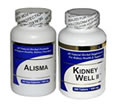Featured Health Support Products

Kidney Health Combo Pak #2 for those concerned with:
- Glomerulonephritis
- High Creatinine Levels*
- Lowered Kidney Function*
Kidney Health Pak 2 Contains: Kidney Well II and Alisma
100% Money Back Guarantee!
Minimal Change Disease is also called:
- Minimal Change GN
- Minimal Change Glomerulonephritis
- Minimal Lesion Glomerulonephritis
- Nil Disease (aka Lipoid Nephrosis)
- Minimal Change Glomerular Disease
- Idiopathic nephrotic syndrome of childhood
- Minimal GN
Minimal Change Disease, aka Minimal Change GN is a disease of the kidney that is most commonly found in children, although 20% of cases of this condition are found in Adults.
In this form of Glomerulonephritis, there is damage to the tiny blood-filtering units, called glomeruli, which are inside the nephron (the functional unit of the kidney that is responsible for purification and filtration of the blood). Minimal Change Disease gets its name since the damage isn't visible under a regular microscope and can only be identified under an electron microscope.
Some of the common conditions associated with Minimal Change GN is proteinuria, increased risk of infections like urinary tract infections and nephrotic syndrome.
Nephrotic syndrome (NS)is a general term that refers to conditions of edema or oedema (water retention) and proteinuria which occurs when protein leaks from the blood into the urine. NS and this form of kidney disease can be caused by Minimal Change Disease.
Symptoms of Minimal Change Disease are often similar to Nephrotic Syndrome and can include increased levels of protein in urine (proteinuria), foamy urine appearance, swelling around the eyes, abdomen, feet and ankles (edema), and weight gain due to fluid retention.
While the Cause of Minimal Change Disease is unknown according to western medicine, they are theories that the disease may occur after:
- Allergic reactions
- Viral infection
- Recent immunizations
Minimal change disease is the most common cause of nephrotic syndrome in children.
Treatment in Western Medicine generally consists of the use of steroids for Minimal Change Disease. If steroids are unsuccessful at treating this condition, cytotoxic agents are used. Since both of the aforementioned drugs can contain potentially harmful side effects, patient/doctor communication about these drugs side effects is important whenever considering these medications.
Read About Kidney Health Support...*
[Top]

 Get Well Natural, LLC
Get Well Natural, LLC  Kidney Function & Regeneration Health
Kidney Function & Regeneration Health  Platelet & Blood Cell Health
Platelet & Blood Cell Health  Prostate, Flow & Function Health
Prostate, Flow & Function Health  General Mind & Body Health
General Mind & Body Health  Heart, Cholesterol & Cardio Health
Heart, Cholesterol & Cardio Health  Allergy-Free Body
Allergy-Free Body  Anxiety & Stress
Anxiety & Stress  Blood Platelet Counts & Function
Blood Platelet Counts & Function  Blood Pressure Health
Blood Pressure Health  Kidney Function Health
Kidney Function Health  Immune System Health & Balance
Immune System Health & Balance  Prostate & Urinary Health Function
Prostate & Urinary Health Function  Blood Sugar Balance
Blood Sugar Balance  Cardiovascular Heart Health
Cardiovascular Heart Health  Detoxification & Healthy Cells
Detoxification & Healthy Cells  Women's Health
Women's Health  Liver Regeneration
Liver Regeneration  Pain-Free Body
Pain-Free Body  Water & Air Filtration
Water & Air Filtration 


